Anpassungsfähigkeit und Resilienz des Finanzsystems
Diese Forschungsgruppe untersucht kritische Aspekte der Anpassungsfähigkeit und Widerstandsfähigkeit von Finanzsystemen. Sie analysiert die Auswirkungen von Naturkatastrophen auf Finanzsysteme, die Auswirkungen politischer Präferenzen für die grüne Transformation und die Bedeutung von Kultur in den Volkswirtschaften.
Forschungscluster
Finanzresilienz und RegulierungIhr Kontakt

Mitglied - Abteilung Finanzmärkte
PROJEKTE
07.2016 ‐ 12.2018
Relationship Lenders and Unorthodox Monetary Policy: Investment, Employment, and Resource Reallocation Effects
Leibniz-Gemeinschaft
We combine a number of unique and proprietary data sources to measure the impact of relationship lenders and unconventional monetary policy during and after the European sovereign debt crisis on the real economy. Establishing systematic links between different research data centers (Forschungsdatenzentren, FDZ) and central banks with detailed micro-level information on both financial and real activity is the stand-alone proposition of our proposal. The main objective is to permit the identification of causal effects, or their absence, regarding which policies were conducive to mitigate financial shocks and stimulate real economic activities, such as employment, investment, or the closure of plants.
01.2015 ‐ 12.2019
Interactions between Bank-specific Risk and Macroeconomic Performance
Deutsche Forschungsgemeinschaft (DFG)
Referierte Publikationen
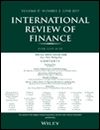
Cross-border Exposures and Financial Contagion
in: International Review of Finance, Nr. 2, 2010
Abstract
Integrated financial markets provide opportunities for expansion and improved risk sharing, but also pose threats of contagion risk through cross-border exposures. This paper examines cross-border contagion risk over the period 1999–2006. To that purpose we use aggregate cross-border exposures of 17 countries as reported in the Bank for International Settlements Consolidated Banking Statistics. We find that a shock that affects the liabilities of one country may undermine the stability of the entire financial system. Particularly, a shock wiping out 25% (35%) of US (UK) cross-border liabilities against non-US (non-UK) banks could lead to bank contagion eroding at least 94% (45%) of the recipient countries' banking assets. We also find that since 2006 a shock to Eastern Europe, Turkey and Russia affects most countries. Our simulations also reveal that the ‘speed of propagation of contagion’ has increased in recent years resulting in a higher number of directly exposed banking systems. Finally, we find that contagion is more widespread in geographical proximities.
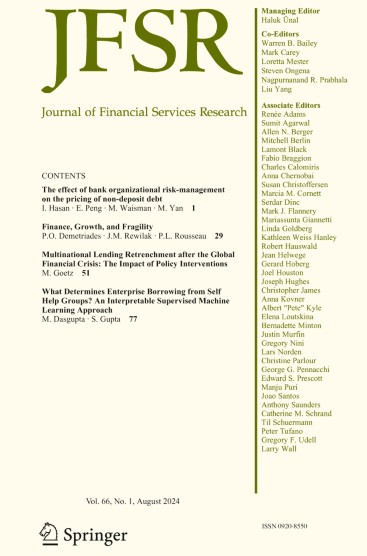
The Impact of Bank and Non-bank Financial Institutions on Local Economic Growth in China
in: Journal of Financial Services Research, Nr. 2, 2010
Abstract
This paper provides evidence on the relationship between finance and growth in a fast growing country, such as China. Employing data of 27 Chinese provinces over the period 1995–2003, we study whether the financial development of two different types of financial institutions — banks and non-banks — have a (significantly different) impact on local economic growth. Our findings indicate that banking development shows a statistically significant and economically more pronounced impact on local economic growth.

Lending Technology, Bank Organization and Competition
in: Journal of Financial Transformation, 2009
Abstract
This paper reviews recent theoretical and empirical studies investigating how both bank technology and organization shape bank-borrower interactions. We refer to two related concepts for bank technology. First, the technologies banks employ in loan granting decisions and second, the advances in information technology linked to the bank's lending technology. We also summarize and interpret the theoretical and empirical work on bank organization and its influence on lending technologies. We show that the choice of lending technology and bank organization depend heavily on the availability of information, the technological progress in the collection of information, as well as the banking market structure and the legal environment. We draw important policy conclusions from the literature. Competition authorities and supervisors have to remain alert to the consequences of the introduction of any new technology because: (1) advances in technology do not necessarily lead to more intense banking competition, and (2) the impact of technological and financial innovation on financial efficiency and stability depends on the incentives of the entire „loan production chain.‟

The Impact of Organizational Structure and Lending Technology on Banking Competition
in: Review of Finance, Nr. 2, 2009
Abstract
We investigate how bank organization shapes banking competition. We show that a bank's geographical lending reach and loan pricing strategy is determined by its own and its rivals’ organizational structure. We estimate the impact of organization on the geographical reach and loan pricing of a large bank. We find that the reach of the bank is smaller when rival banks are large and hierarchically organized, have superior communication technology, have a narrower span of organization, and are closer to a decision unit with lending authority. Rival banks’ size and the number of layers to a decision unit soften spatial pricing.

Dynamic Order Submission Strategies with Competition between a Dealer Market and a Crossing Network
in: Journal of Financial Economics, Nr. 3, 2009
Abstract
We analyze a dynamic microstructure model in which a dealer market (DM) and a crossing network (CN) interact for three informational settings. A key result is that coexistence of trading systems generates systematic patterns in order flow, which depend on the degree of transparency. Further, we study overall welfare, measured by the gains from trade of all agents, and compare it with the maximum overall welfare. The discrepancy between both measures is attributable to two inefficiencies. Due to these inefficiencies, introducing a CN next to a DM, as well as increasing the transparency level, not necessarily produces greater overall welfare.
Arbeitspapiere
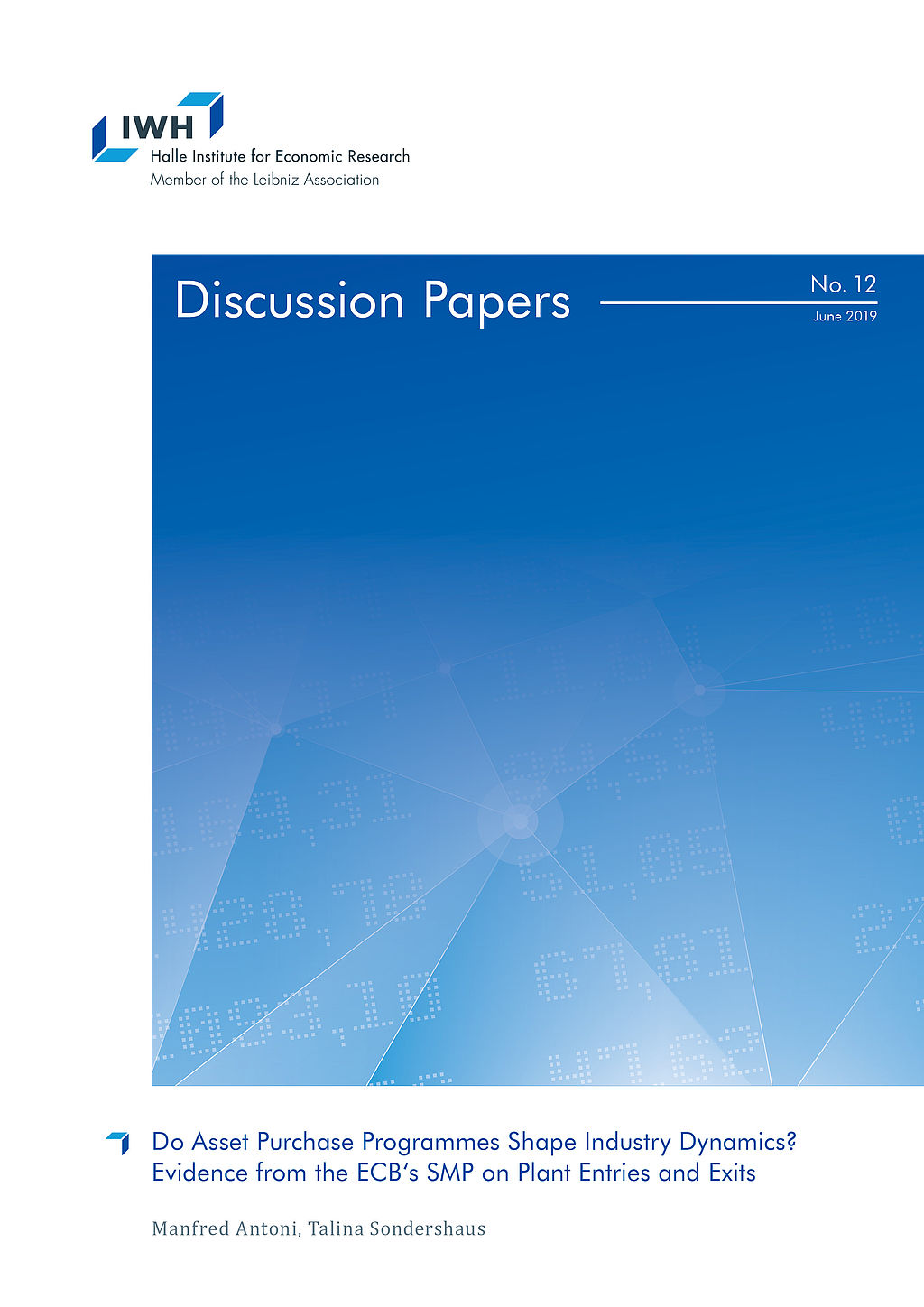
Do Asset Purchase Programmes Shape Industry Dynamics? Evidence from the ECB's SMP on Plant Entries and Exits
in: IWH Discussion Papers, Nr. 12, 2019
Abstract
Asset purchase programmes (APPs) may insulate banks from having to terminate relationships with unproductive customers. Using administrative plant and bank data, we test whether APPs impinge on industry dynamics in terms of plant entry and exit. Plants in Germany connected to banks with access to an APP are approximately 20% less likely to exit. In particular, unproductive plants connected to weak banks with APP access are less likely to close. Aggregate entry and exit rates in regional markets with high APP exposures are also lower. Thus, APPs seem to subdue Schumpeterian cleansing mechanisms, which may hamper factor reallocation and aggregate productivity growth.
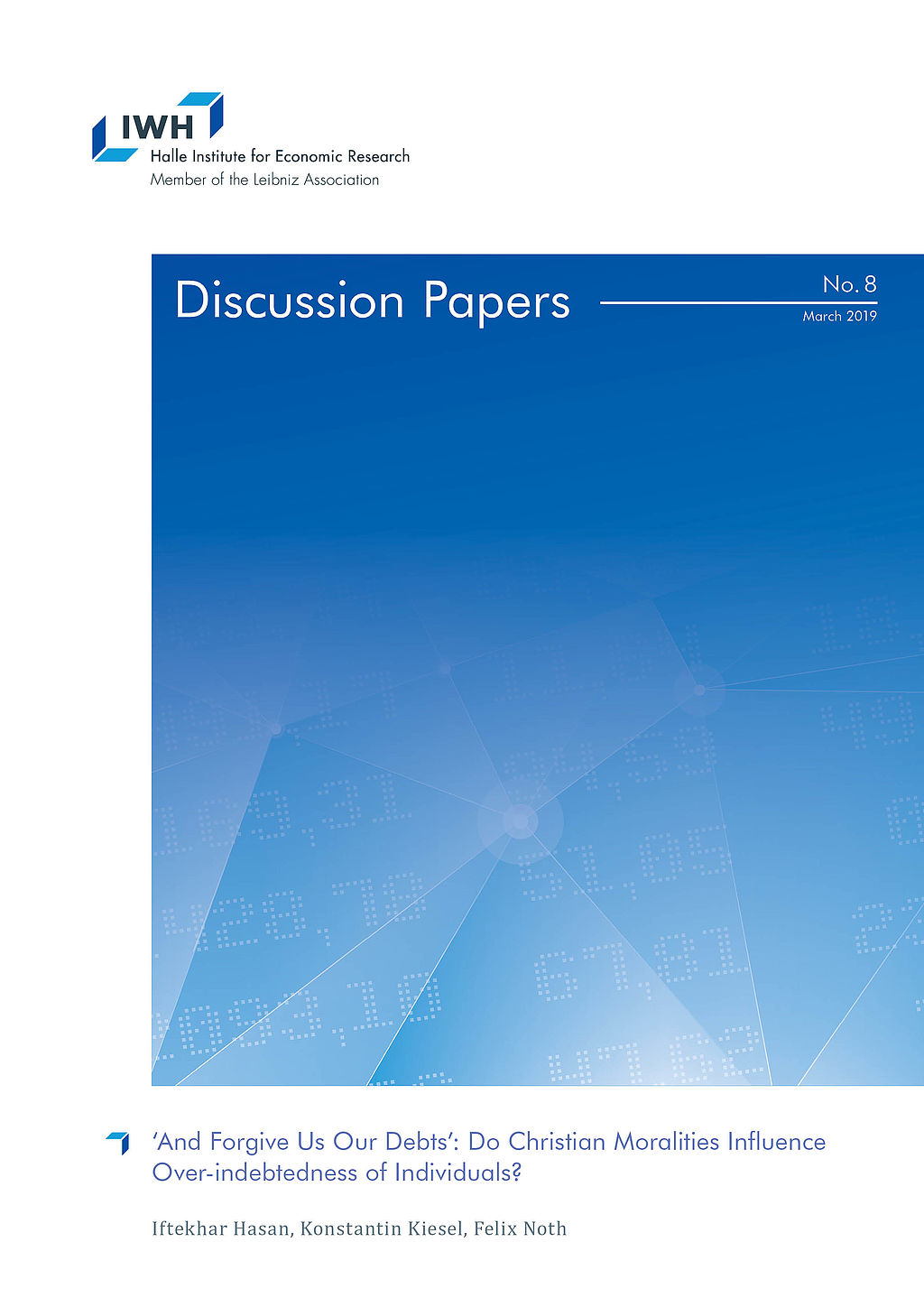
‘And Forgive Us Our Debts’: Do Christian Moralities Influence Over-indebtedness of Individuals?
in: IWH Discussion Papers, Nr. 8, 2019
Abstract
This paper analyses whether Christian moralities and rules formed differently by Catholics and Protestants impact the likelihood of households to become overindebted. We find that over-indebtedness is lower in regions in which Catholics outweigh Protestants, indicating that Catholics‘ forgiveness culture and a stricter enforcement of rules by Protestants serve as explanations for our results. Our results provide evidence that religion affects the financial situations of individuals and show that even 500 years after the split between Catholics and Protestants, the differences in the mind-sets of both denominations play an important role for situations of severe financial conditions.
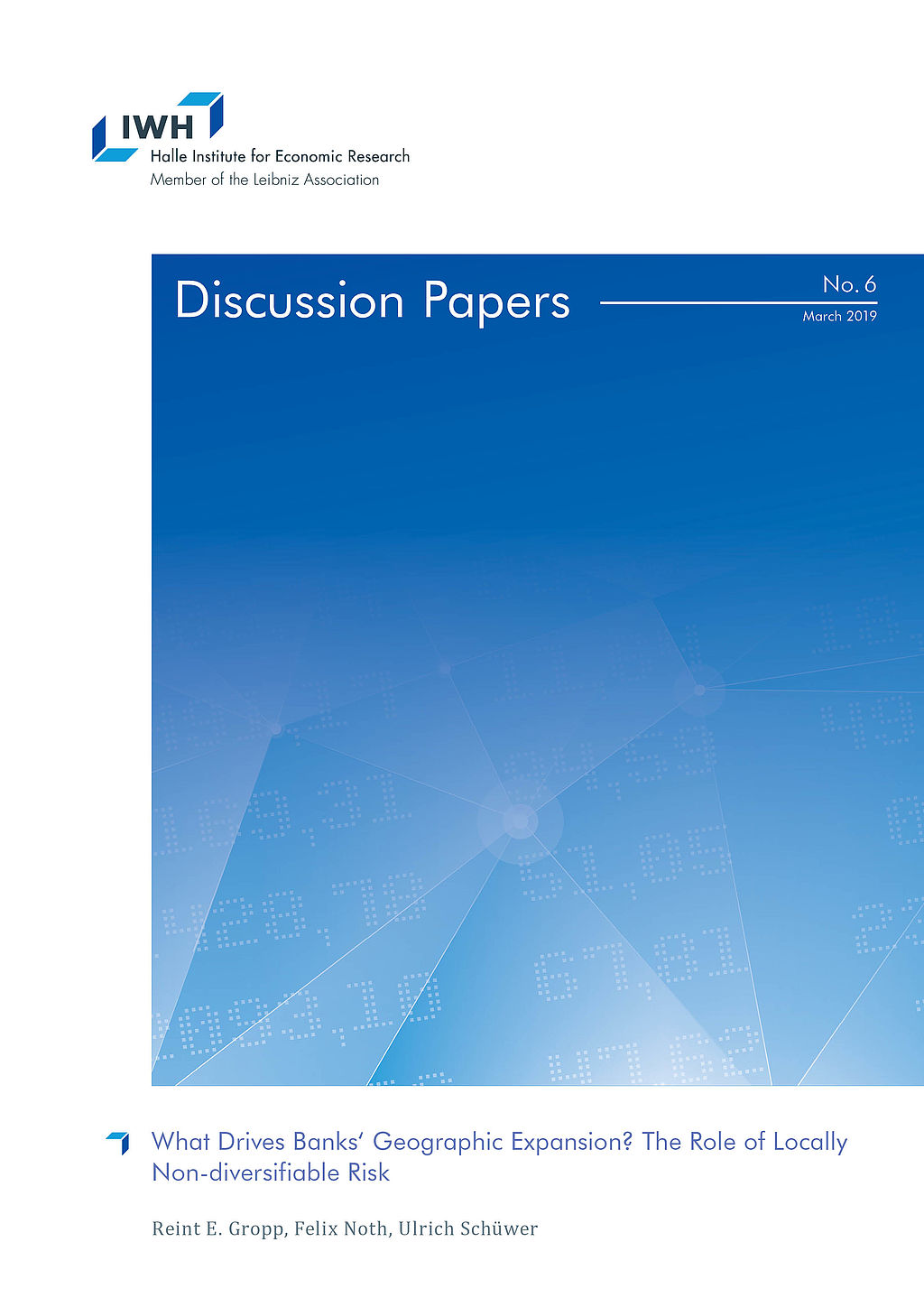
What Drives Banks‘ Geographic Expansion? The Role of Locally Non-diversifiable Risk
in: IWH Discussion Papers, Nr. 6, 2019
Abstract
We show that banks that are facing relatively high locally non-diversifiable risks in their home region expand more across states than banks that do not face such risks following branching deregulation in the 1990s and 2000s. These banks with high locally non-diversifiable risks also benefit relatively more from deregulation in terms of higher bank stability. Further, these banks expand more into counties where risks are relatively high and positively correlated with risks in their home region, suggesting that they do not only diversify but also build on their expertise in local risks when they expand into new regions.
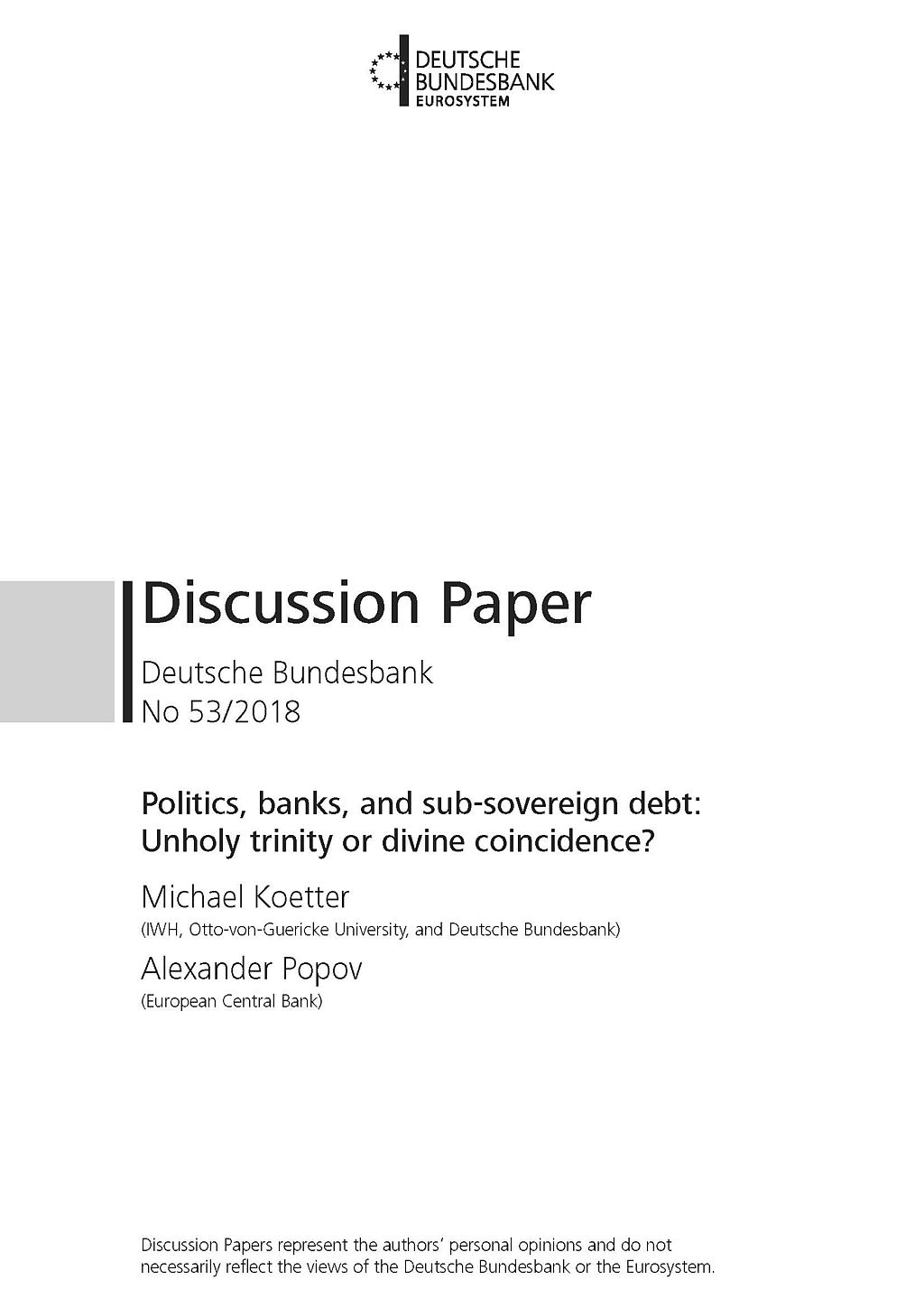
Politics, Banks, and Sub-sovereign Debt: Unholy Trinity or Divine Coincidence?
in: Deutsche Bundesbank Discussion Paper, Nr. 53, 2018
Abstract
We exploit election-driven turnover in State and local governments in Germany to study how banks adjust their securities portfolios in response to the loss of political connections. We find that local savings banks, which are owned by their host county and supervised by local politicians, increase significantly their holdings of home-State sovereign bonds when the local government and the State government are dominated by different political parties. Banks' holdings of other securities, like federal bonds, bonds issued by other States, or stocks, are not affected by election outcomes. We argue that banks use sub-sovereign bond purchases to gain access to politically distant government authorities.

May the Force Be with You: Exit Barriers, Governance Shocks, and Profitability Sclerosis in Banking
in: Deutsche Bundesbank Discussion Paper, Nr. 49, 2018
Abstract
We test whether limited market discipline imposes exit barriers and poor profitability in banking. We exploit an exogenous shock to the governance of government-owned banks: the unification of counties. County mergers lead to enforced government-owned bank mergers. We compare forced to voluntary bank exits and show that the former cause better bank profitability and efficiency at the expense of riskier financial profiles. Regarding real effects, firms exposed to forced bank mergers borrow more at lower cost, increase investment, and exhibit higher employment. Thus, reduced exit frictions in banking seem to unleash the economic potential of both banks and firms.


















